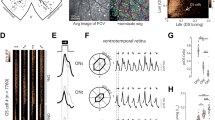Play all audios:

ABSTRACT Kuffler1 described the receptive fields of cat retinal ganglion cells as having a concentric arrangement. This has usually been taken to mean that they are approximately circular in
form (see, for example, ref. 2). Hammond3 tested the circularity of the centre component of receptive fields by plotting a contour of isosensitivity to a small flashed spot. He concluded
that centres were often elliptical (average ratio of major to minor axis 1.23) and that more than 50% of the recorded cells had the major axis oriented within ±20° of the horizontal. Such
data are important for discussions4 of the neurophysiological basis of the ‘Oblique effect’ (reduced visibility for periodic grating patterns when oriented away from the vertical or
horizontal) observed in psychophysical experiments on humans because subcortical units are often assumed to be orientationally unbiased. Orientation selectivity is a prominent attribute of
visual cortical neurones5 so analysis has usually emphasized the distribution of orientation selectivity at that level6–8. The results presented here redirect attention to the retinal level
since they reveal a previously unsuspected systematic relation between orientation bias of ganglion cells and their location relative to the area centralis. Access through your institution
Buy or subscribe This is a preview of subscription content, access via your institution ACCESS OPTIONS Access through your institution Subscribe to this journal Receive 51 print issues and
online access $199.00 per year only $3.90 per issue Learn more Buy this article * Purchase on SpringerLink * Instant access to full article PDF Buy now Prices may be subject to local taxes
which are calculated during checkout ADDITIONAL ACCESS OPTIONS: * Log in * Learn about institutional subscriptions * Read our FAQs * Contact customer support SIMILAR CONTENT BEING VIEWED BY
OTHERS DEVELOPMENT AND ORGANIZATION OF THE RETINAL ORIENTATION SELECTIVITY MAP Article Open access 06 June 2024 NATURAL SCENE SAMPLING REVEALS RELIABLE COARSE-SCALE ORIENTATION TUNING IN
HUMAN V1 Article Open access 29 October 2022 STIMULUS EDGES INDUCE ORIENTATION TUNING IN SUPERIOR COLLICULUS Article Open access 08 August 2023 REFERENCES * Kuffler, S. W. _Cold Spring Harb.
Symp. quant. Biol._ 17, 281–292 (1952); _J. Neurophysiol._ 16, 37–68 (1953). Article CAS Google Scholar * Enroth-Cugell, C. & Robson, J. G. _J. Physiol., Lond._ 187, 517–552 (1966).
Article CAS Google Scholar * Hammond, P. W. _J. Physiol., Lond._ 234, 64P–66P (1973); 242, 99–118 (1974). CAS PubMed Google Scholar * Appelle, S. _Psychol. Bull._ 78, 266–278 (1972).
Article CAS Google Scholar * Hubel, D. W. & Wiesel, T. N. _J. Physiol., Lond._ 160, 106–154 (1962). Article CAS Google Scholar * Mansfield, R. J. W. _Science_ 186, 1133–1135
(1974); _Brain Res._ 149, 229–234 (1978). Article ADS CAS Google Scholar * Rose, D. & Blakemore, C. _Expl Brain Res._ 20, 1–17 (1974). Article CAS Google Scholar * Finlay, B. L.,
Schiller, P. H. & Volman, S. F. _Brain Res._ 105, 350–352 (1976). Article CAS Google Scholar * Levick, W. R. _Med. Electron biol. Engng_ 10, 510–515 (1972). Article CAS Google
Scholar * Cleland, B. G. & Levick, W. R. _J. Physiol., Lond._ 240, 421–456 (1974). Article CAS Google Scholar Download references AUTHOR INFORMATION AUTHORS AND AFFILIATIONS *
Department of Physiology, John Curtin School of Medical Research, Canberra, Australia, 2601 W. R. Levick & L. N. Thibos Authors * W. R. Levick View author publications You can also
search for this author inPubMed Google Scholar * L. N. Thibos View author publications You can also search for this author inPubMed Google Scholar RIGHTS AND PERMISSIONS Reprints and
permissions ABOUT THIS ARTICLE CITE THIS ARTICLE Levick, W., Thibos, L. Orientation bias of cat retinal ganglion cells. _Nature_ 286, 389–390 (1980). https://doi.org/10.1038/286389a0
Download citation * Received: 04 February 1980 * Accepted: 02 May 1980 * Issue Date: 24 July 1980 * DOI: https://doi.org/10.1038/286389a0 SHARE THIS ARTICLE Anyone you share the following
link with will be able to read this content: Get shareable link Sorry, a shareable link is not currently available for this article. Copy to clipboard Provided by the Springer Nature
SharedIt content-sharing initiative
